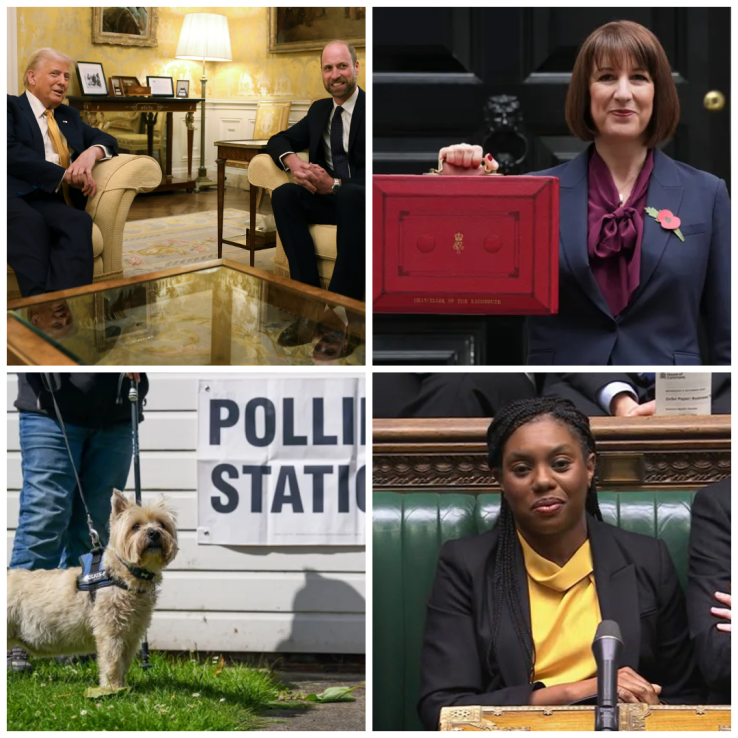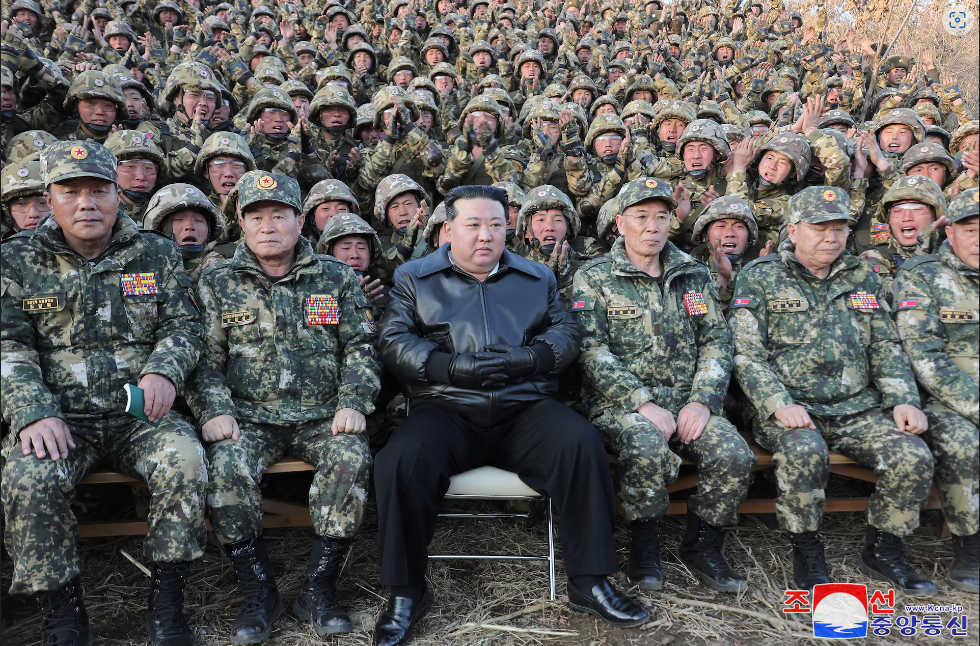A look back at the highs and lows of politics in 2024
With elections in the UK and US in 2024, a new government, and a fresh opposition leader, watchers of Westminster and elsewhere have had a busy year in politics. At City AM we’ve followed every twist and turn as Labour secured an election victory in July, Donald Trump pulled off a White House comeback and [...]


With elections in the UK and US in 2024, a new government, and a fresh opposition leader, watchers of Westminster and elsewhere have had a busy year in politics.
At City AM we’ve followed every twist and turn as Labour secured an election victory in July, Donald Trump pulled off a White House comeback and Kemi Badenoch became the first black woman to lead a major UK political party.
And as the year draws to a close, we’re taking a look back at the highs and lows – from the unexpected scandals to the Parliamentary set pieces – that made up 2024 in politics.
Winter 2024
The year got underway as then Prime Minister Rishi Sunak told the public on 4 January that his “working assumption” was for a general election in the second half of the year.
ITV also broadcast their drama Mr Bates vs The Post Office which prompted ex-CEO Paula Vennells to return her CBE, and Sunak to announce emergency legislation to exonerate victims.
In February, then shadow Chancellor Rachel Reeves said Labour would not hike corporation tax if elected, while the party scrapped its plans to invest £28bn a year on green investment.
Power-sharing in Northern Ireland’s Stormont was restored, as Sinn Féin’s Michelle O’Neill became first minister alongside the DUP’s Emma Little-Pengelly as deputy.
Commons Speaker Sir Lindsay Hoyle faced pressure to resign after a debate calling for a ceasefire in Gaza descended into chaos. More than 60 MPs called for him to step down.
George Galloway won the Rochdale by-election for the Workers Party of Britain, returning to Parliament to represent his fifth constituency. Sunak warned of “extremist” rhetoric in Britain.
In March, then Chancellor Jeremy Hunt delivered the Spring Budget, while Theresa May announced she would step down at the next general election, and Conservative MP for Ashfield, Lee Anderson, defected to join Reform UK, becoming the party’s first sitting MP.
Tory donor Frank Hester apologised for reported comments about Labour MP Diane Abbott, after he allegedly said she made him “want to hate all black women” and that she “should be shot”.
On 14 March, Sunak ruled out a general election on May 2 – the date of the local elections – and Vaughan Gething was elected as Wales’ First Minister, while DUP leader Sir Jeffrey Donaldson resigned after being charged with rape and other historical sexual offences.
Spring 2024
In April, Tory MP William Wragg resigned the party whip and committee posts after he admitted he shared fellow MPs’ phone numbers amid the Westminster ‘honeytrap’ scandal.
In Labour-land, Angela Rayner faced a police investigation over allegations about her council house sale, while Sir Keir Starmer said Labour would bump up defence spending to 2.5 per cent.
Former SNP chief executive Peter Murrell was rearrested and charged with embezzlement, while MPs and peers battled over Sunak’s Rwanda legislation, which passed in April.
Two men, including a parliamentary researcher, were charged with spying for China. Sunak pledged to increase UK defence spending to 2.5 per cent of GDP by 2030.
Scottish First Minister Humza Yousaf faced a vote of no confidence, and announced he would resign. John Swinney was appointed as his successor, with Kate Forbes as deputy.
Local elections were held on 2 May. The Conservatives lost more than 400 seats, and Labour won back key councils and all but one mayoral race, while Sadiq Khan was re-elected in London.
Tory MP for Dover Natalie Elphicke defected to Labour, on 8 May and two weeks later, Sunak announced that a general election would be held.
As spring limped into summer, former Labour leader Jeremy Corbyn was removed from the party after he announced plans to stand as an independent candidate in Islington North, while Diane Abbott regained the whip after being suspended in 2023, and prepared for re-election in Hackney North.
Summer 2024
At the start of June, Nigel Farage said he would stand as an MP in Clacton for Reform UK, after previously saying he wouldn’t, and has a milkshake thrown at him at his campaign launch the following day.
Vaughan Gething lost a vote of no confidence in Wales over allegations about donations, and Sunak had to apologise for leaving D-Day commemorations early, days before he unveiled the Tory manifesto, which promised to cut national insurance and halve immigration.
People including MPs, police officers and CCHQ officials faced investigation by the Gambling Commission over betting on the general election date, with some investigated by the police.
Starmer unveiled Labour’s manifesto on 13 June, vowing a focus on economic growth and wealth creation. Reform UK launched their manifesto, or ‘contract’, and overtake the Tories in a poll.
The Sun and the Sunday Times endorsed the Labour Party ahead of the general election on July 4, which Labour won in a landslide victory, which also saw Reform secure five seats.
Labour scrapped the Rwanda plan, restored compulsory housing targets, set out their plans for new laws in the King’s Speech and Ukrainian president Zelensky addressed cabinet.
Vaughan Gething resigned as First Minister of Wales, and was replaced by Eluned Morgan. Kemi Badenoch, James Cleverly, Robert Jenrick, Priti Patel, Mel Stride and Tom Tugendhat announced they were running to replace Rishi Sunak as Tory leader.
In August, Reeves axed winter fuel payments for some pensioners as anti-immigration and far-right riots swept across the UK.
Autumn 2024
In September, Labour ministers including Starmer and Reeves faced the freebie-gate scandal after criticism for accepting donated clothes, accommodation and Taylor Swift tickets. But the standards commissioner decided not to investigate clothing donations to Starmer’s wife, Victoria.
The PM, Chancellor and deputy leader said they will no longer accept donations for clothing, Downing Street confirms.
Junior doctors strikes ended with a new pay deal and Corbyn united with four independent MPs in a pro-Gaza group.
Political parties held their annual conferences, with Starmer setting out his plans for “national renewal” in Liverpool, while the four Tory leadership finalists went head to head in Birmingham in October.
Simon Case, the cabinet secretary and the UK’s most senior civil servant, announced he would resign by the end of the year on health grounds, while the UK said it will return the Chagos Islands to Mauritius.
Labour MP for Canterbury Rosie Duffield resigned from the party over what she called “cruel” policies and “hypocrisy” over gifts and donations.
Downing Street chief of staff and former Partygate invigilator Sue Gray resigned from her role. She was replaced by former campaign manager Morgan McSweeney.
Reeves changed the UK’s debt rules to free up investment, and delivered the first Labour Budget in 14 years on October 30. But she was hit by backlash on tax rises from businesses and farmers – and was later forced to tell the CBI conference she won’t “come back with more”.
At the start of November, Kemi Badenoch beat Robert Jenrick and won the Tory leadership contest, and Republican Donald Trump beat Democrat Kamala Harris and won the US election.
Starmer told the COP29 climate conference in Azerbaijan the UK would aim to cut its emissions by eight per cent by 2035, and met Chinese premier Xi Jinping at the G20 summit in Rio.
In December, Sir Chris Wormald was appointed as the new Cabinet Secretary and Keir Starmer addressed the Lord Mayor’s Banquet at the Guildhall.
New transport secretary Heidi Alexander announced plans to renationalise South Western Railway, C2C and Greater Anglia by autumn 2025, and Starmer gave a speech to set out six objectives on the economy, housebuilding, NHS, policing, education and green energy.
Work and pensions secretary Liz Kendall rejected an ombudsman recommendation to pay financial compensation to the estimated 3.6m women born in the 1950s who were adversely affected by changes to the state pension age back in the 2010s.
Nigel Farage said his Reform UK party was in “open negotiations” with US billionaire Elon Musk about him donating to the party after the pair met at Donald Trump’s Mar-a-Lago estate in Florida.
Ahead of Christmas, Starmer turned on the lights outside Downing Street as the UK held its breath for one final push into the new year – one likely to be just as full of political drama, mishaps and change.



